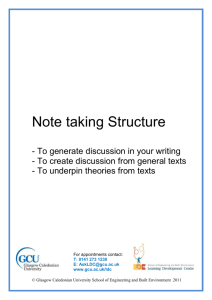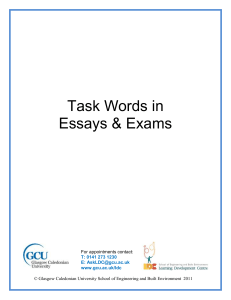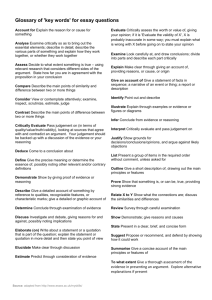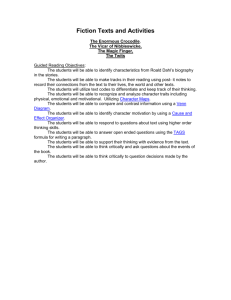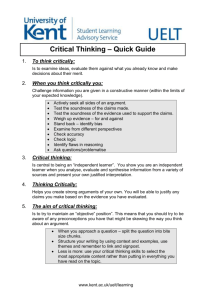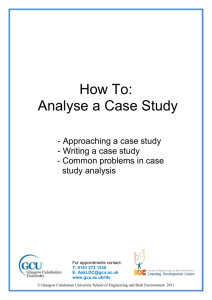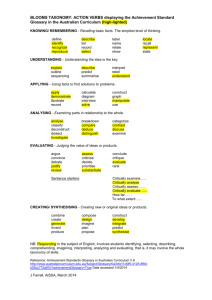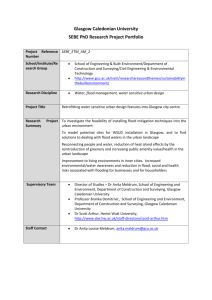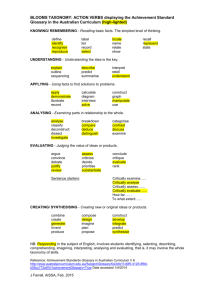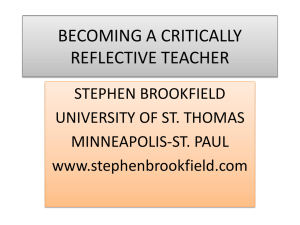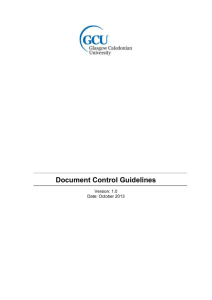reading for critical appraisals
advertisement
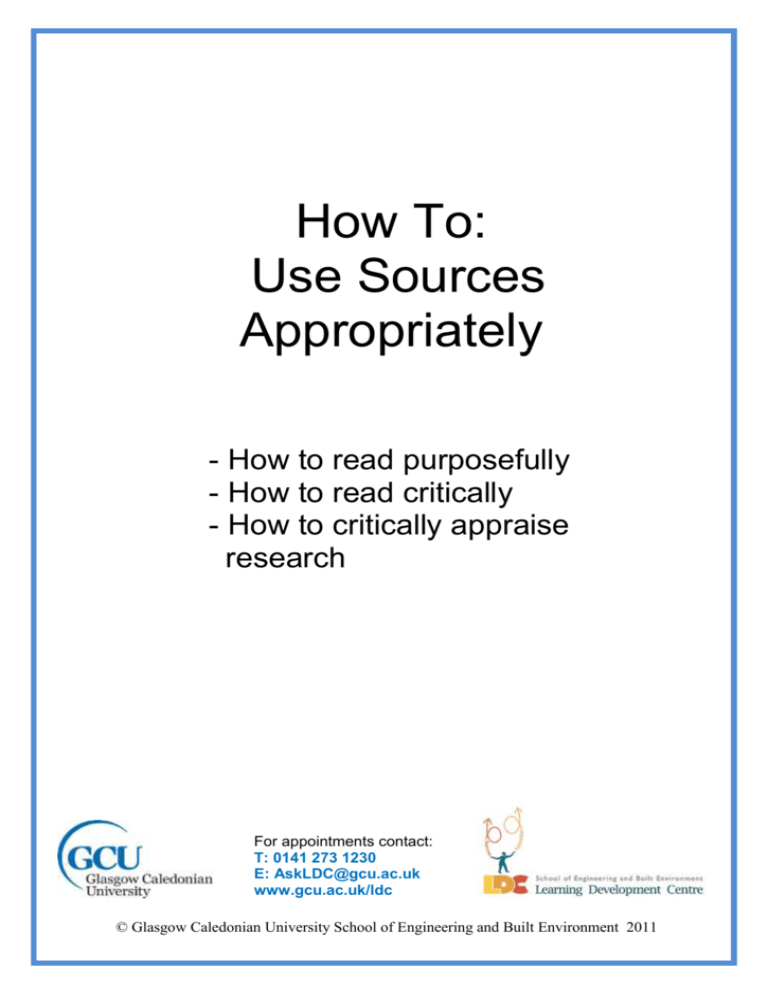
How To: Use Sources Appropriately - How to read purposefully - How to read critically - How to critically appraise research For appointments contact: T: 0141 273 1230 E: AskLDC@gcu.ac.uk www.gcu.ac.uk/ldc © Glasgow Caledonian University School of Engineering and Built Environment 2011 How to critically review literature Section 1 commences by suggesting one way of reading quickly and purposefully. The handout then explains some reasons why you the student, need to read critically. Section 2 suggests questions that you may wish to consider when reading critically. Section 3 briefly explains the difference between qualitative and quantitative research and suggests some additional questions that may be applied when carrying out a critical appraisal of literature. Section 1 SQ3R S Q R R R Carry out a quick survey of the text While you are reading quickly through the material, start asking yourself some questions, either that may give you the underlying meaning to the material or help answer the assignment. Read the text again, this time more carefully Now that you have finished reading, try to recall the main points/ questions Check if you have recalled the information correctly by reviewing the points / answers to the questions Section 2 In order to be able to critically appraise the article(s), you need to provide evidence of critical thinking and apply critical analysis in a balanced and objective manner. It is essential therefore to recognise, analyse and evaluate the reasoning and forms of arguments in texts. When you are reading critically you are giving a personal response to what has been written, but this response requires to be supported by evidence. Evidence is research findings that must be substantiated. For more on how to analyse evidence in a paper refer to the handout – How to review a research paper When carrying out a literature review, you are expected to read a selection of texts. Moreover you should relate the different writings to each other, furthermore you need to indicate their similarities, differences, contradictions and perhaps indicate what is missing. © Glasgow Caledonian University School of Engineering and Environment (LDC, 2011) 2 When you are critically reading you must not accept things as being true, merely because it has been published. You need to explain clearly to your reader the values, theories, methods that have informed you when reading the text. You must also note what vocabulary has been used in the text as all of these may have affected the meaning. Are the authors: stating / asserting/ claiming / contending / concluding? You may need to be aware of the background of the text/writer/journal. For example is the writer a respected researcher? Or is s/he qualified in his or her field. Alternatively, is the journal particularly noted in its field? Can you be sure that the text you are reading is from a reliable source? Please note that even though the article may have been on the Internet or published in a journal, the article may not be well researched. Assessing an argument Within the text, search for the conclusion and reasons by looking for the ‘conclusion indicators’. This will include words such as : Therefore, thus, in short, altogether, overall, thus we can see that, on the whole, to summarise. At the same time look for ‘reason indicators’. Words that are used are: Because, for, since, and/or, therefore, as a result; accordingly, it is evident that; for this reason; according to X; this suggests that. Whilst you are carrying that process ask yourself: ‘What is the underlying message in the text?’ ‘What reasons or evidence is the text using to support the message, so that I accept or believe this?’ Identify assumptions What are the basic reasons for that belief or assumption? Can you find any additional reasons for that belief or assumption? Does the text reach any conclusion halfway? How do the words used affect the meaning? Can you make comparisons with similar situations? What assumptions can you make re the explanation outlined in the text? © Glasgow Caledonian University School of Engineering and Environment (LDC, 2011) 3 Evaluating How would you find out further information so that you can evaluate the truth of the assumptions? How can you assess the reliability of the journal or the author(s)? When assessing the conclusion, is there any additional evidence that strengthens or weakens the conclusion? Is there anything in the text that, which may be true? Is there anything in the text that, you know is true? Have you assessed how believable/reasonable/convincing the arguments are that you have identified? How appropriate are your arguments when compared with other texts and or situations? Can you draw any conclusion from the text(s)? If so, do they suggest that the reasoning in the text may be faulty in any way? Do any of the reasons or assumptions cover a general principle? Have you evaluated these? Does the reasoning support the conclusion in the text appropriately? If not can you explain the ways in which the reasoning is flawed? Section 3 It is important that you critically examine and evaluate the methods used in the research. This involves identifying strengths, weaknesses and limitations of the research applied. You may also be expected to submit your own research as part of your assignment, this will in all probability, include a methods section. Reading about different methods of research will help you decide upon the most appropriate one for your research. Refer to your indicative reading list and or the Research Methods module for further guidance. The tests may include results from quantitative or qualitative research. The research approaches may have used action research, case studies, experiments or surveys. The techniques may have included documents, interviews, observation or questionnaires. ‘Quantitative research is empirical research where the data are in the form of numbers. Qualitative research is empirical research where the data are not in the form of numbers.’ (Punch 1998, cited in Blaxter, Hughes and Tight, 2001, p 64) ‘Qualitative’ implies a direct concern with experience as it is ‘lived’ or ‘felt’ or ‘undergone’. (In contrast, ‘quantitative research, often taken to be the opposite idea, is indirect and abstracts and treats experiences as similar., adding or multiplying them together, or ‘quantifying’ them.) (Sherman and Webb, 1988, cited in Blaxter, Hughes and Tight, 2001, p 64) © Glasgow Caledonian University School of Engineering and Environment (LDC, 2011) 4 In your critical reading ask yourself the following questions: Which methods have been used in the text? What are the advantages of the methods that have been selected? What are the disadvantages? What other methods could have been used? Adapted from Blaxter L, Hughes C & Tight M. (2001) How to Research, Buckingham: Open University Press. Chapters 4 & 6 © Glasgow Caledonian University School of Engineering and Environment (LDC, 2011) 5
